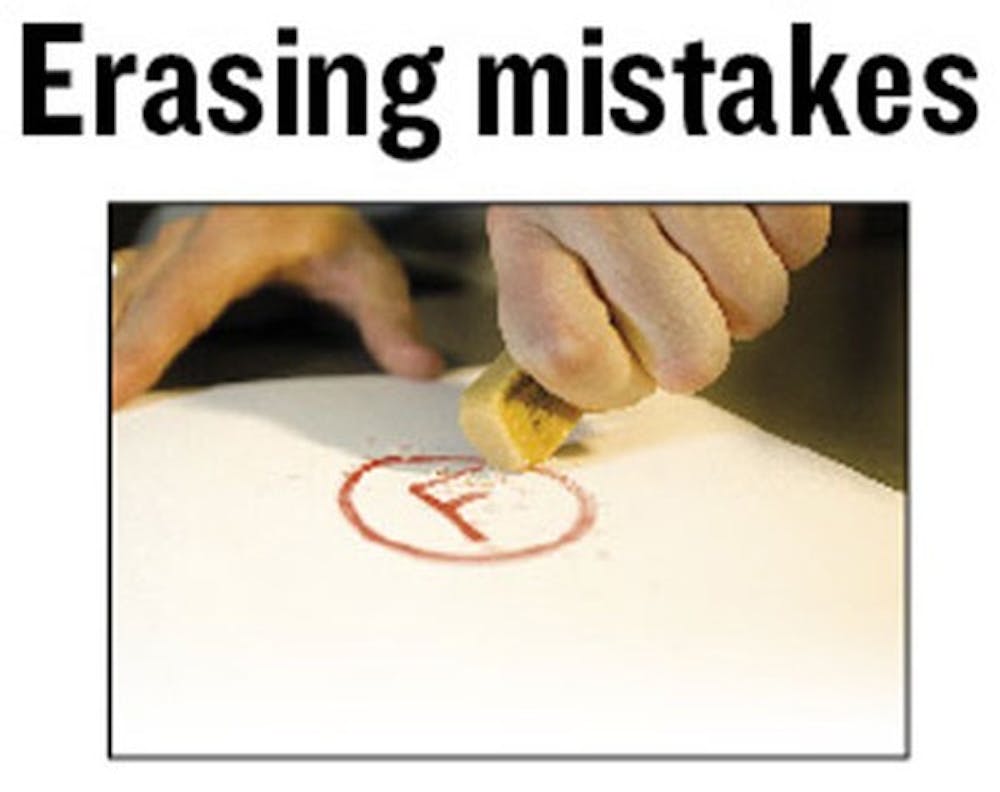A majority of college students begin school with one major and graduate with another. But bad grades from the first major can still pull down their cumulative GPAs.
Basic redlining policies allow students changing programs of study to drop courses they did not perform well in if the courses are not required for their new major.
Legislation supporting the enactment of a redlining policy at Ball State University passed in Student Senate last spring. It was then given to the Undergraduate Education Committee in University Senate, where it was recently voted down, Undergraduate Education Committee Chairman Michael O'Hara said. However, the Admissions and Credits Committee recently expressed interest in taking another look at the legislation, Student Government Association Secretary of Governance Ashley Johnson said.
"I explained the legislation to them and they want to give it a chance to pass in University Senate," she said. "They were confused that it was sent to a committee it shouldn't have gone to."
As the Admissions and Credits Committee, she said it seemed logical it would discuss a redlining issue concerning grades and credit hours.
While University Senate Chairman Bruce Hozeski said it was unusual for one committee to vote down an issue and have another committee pick it up, there was a possibility that the Agenda Committee could assign the proposal for reconsideration in the next few weeks.
Faculty on the Undergraduate Education Committee voted against a redlining policy because they felt grades were a good indicator of success, O'Hara said. Grades are significant because most failures can be attributed more to the student than the class, he said.
"The faculty certainly was sympathetic to the idea that students are spending money, not being successful and being punished because their GPA follows them around," O'Hara said. "But grades are not like shopping for clothes where if you bought the wrong one you can return it for a new one."
The committee also discussed the administrative problems that could occur when colleges try to coordinate redlining, he said.
Admissions and Credits Committee is not guaranteeing the proposal will pass if the committee is allowed to reconsider it, but Secretary of Admissions and Credits Committee Michael Haynes said the proposal was worth a little more examination.
"We know some students get painted into a corner, and the academic forgiveness policy has in it some notions on a similar line," he said. "It might be reasonable to think if a student is changing directions entirely, to let them do so from a grade standpoint."
Ball State is not the first university to consider or use a redlining policy, and Haynes said the committee would look at what worked and did not work at other schools.
Purdue University had a redlining policy for several decades but voted in the fall to do away with it. Several replacement policies have been suggested, and Purdue's Educational Policy Committee Chairman George Bodner said he hoped one would be approved before the end of February when the old redlining policy officially ends.
There were several problems leading to the decision to give up the old system, Bodner said. Students abused redlining to improve their GPAs, and there was no university-wide policy, so individual schools and colleges made their own policies.
"Most of decisions are made in the schools, so what happened was there was a lot of unevenness," Judy Hack, Faculty Senate Chairwoman at Purdue's Calumet campus, said. "In one school you could get a lot of courses forgiven and in another you couldn't."
Purdue's University Senate will vote on an alternative redlining proposal at its Feb. 20 meeting. Under the proposed policy, Purdue would use two grade tracking systems, Bodner said. The new proposals include a cumulative GPA where all grades a student receives will be used for everything outside of the school system; however, within the system, a graduation index reflecting grade adjustments would be used.
Additionally, grade adjustments would be limited to three freshmen courses, totaling no more than 12 hours, Bodner said. Students would have to decide in the first 24 months of school to drop those grades.
"We are trying to put limits on the grade adjustment policy so it isn't abused," Bodner said. "We want to provide it when it's needed to help students so they don't get trapped by mistakes they made as freshman. But we don't want to let them play games with the system."
The same sentiment of forgiveness was shared by Department of Biology Chairman Carl Warner, who said he sponsored the legislation when it originally came out of Ball State's SGA. Students do not always know what they want to do when they enter school, so they figure it out along the way, he said.
"Some students start a program not knowing what they are going to do," he said. "They are underprepared and underenthused once they begin. But they get into another program and that's where their heart is. That's what should be on their transcript."



